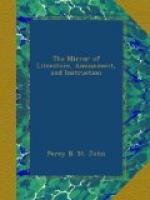Nothing is said of the “Literary Pocket Book;”
but our old friend,
“Time’s Telescope,” will be mounted
as usual.
We also take this opportunity to state that the “ARCANA OF SCIENCE AND ART, FOR 1829,” will appear towards the close of the present year; and, we are enabled to promise its patrons a still greater modicum of novelty and interest than was even comprised in its very successful forerunner.
* * * * *
MARTYRDOM.
There is no truth more abundantly exemplified in the history of mankind, than that the blood of martyrs, spilt in whatever cause, political or religious, is the best imaginable seed for the growth of favour towards their persons, and, as far as conversion depends on feeling, of conversion to their opinions. “Quoites mori emur toties nasciemur.”—Edin. Rev.
* * * * *
ENGLISH LIBERTY.
Our liberty is neither Greek nor Roman; but essentially English. It has a character of its own,—a character which has taken a tinge from the sentiments of the chivalrous ages, and which accords with the peculiarities of our manners, and of our insular situation. It has a language, too, of its own, and a language too singularly idiomatic, full of meaning to ourselves, scarcely intelligible to strangers.—Ibid.
* * * * *
SENSUALITY.
How different is the night of Nature from that of man, and the repose of her scenes from the misrule of his sensual haunts; what a contrast between the refreshing return of her morning, and the feverish agonies of his day-dreams.—Cameleon Sketches.
* * * * *
THE FLIMSY AGE.
Poets sing of the “golden age,” the “silver age,” and the “iron age,” but were they to celebrate this, I think they should call it the flimsy age, for every thing seems made to suit a temporary purpose, without any regard to the sound and substantial. From printed calico to printed books, from Kean’s acting to Nash’s architecture, all is made to catch the eye, to gratify the appetite for novelty, without regard to real and substantial excellence.—Blackwood.
* * * * *
VILLAGE CHURCHES.
We find very few monasteries founded after the twelfth century; the great majority, which rose through the kingdom “like exhalations,” were founded between the eleventh and twelfth centuries; and in all county histories and authentic records, we scarce find a parish church, with the name of its resident rector recorded, before the twelfth century. The first notice of any village church occurs in the




